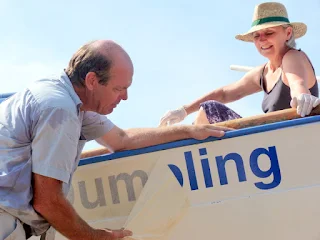Nick Cole, an
Anglo-Australian with strong Algarve
At an age when
most professional men are looking forward to taking it easy, Nick has taken on a
daunting physical and mental challenge. Having spent virtually every day for
the past six months single-handedly refitting a sailing boat he built by himself
in the 1980s, he is preparing to put her back in the water and set off alone
from Portimão into the wide blue yonder.
His boat is
called Dumpling. Nick delights in her simplicity. Most sailing boats nowadays
are high-tech, luxury items, but Dumpling
has no engine, square sails and is equipped only with basic necessities. She's "green".
Nick's latest
adventure is fostered by a seemingly insatiable wanderlust. Born in Melbourne , Australia , he went off with his parents to Singapore at the age of two England where his father
set up a dental practice in London Harley Street Cardiff Dental School ,
Nick started his first job - back in Melbourne Somerset , London (where he
met his wife Sally), the far north of Queensland ,
South Australia and Victoria
He took a break
from dentistry, bought a 45-foot trading boat in Java, sailed her to Bali for a
refit and later “pranged” her on Christmas Island .
After a short
spell working in Charing Cross
Hospital Harley Street Melbourne Portugal
Six years on, the
twins, David and James, completed their secondary education at the Porches International School England
His passion for
sailing was aroused as a child by the stories of English author and journalist
Arthur Ransome. His childhood hero was Joshua Slocum, the first person to sail
around the world single-handed. Nick greatly admires Slocum’s qualities: “He was skilled,
brave, enduring, modest, kind, funny.”
So is Nick.
Having sailed dinghies
and small boats from his school days, the design that took his fancy in the
Melbourne library was an 11.6 metre ketch, gaff rigged and with square sails on
the main mast.
After four years
in the building, the voyage on Dumpling
from England to Portugal
Nick recalls with
typical self-deprecation: “I got a bit beaten up in Biscay and felt like a hero
when I dropped anchor just east of Sagres. But I felt like a berk shortly
afterwards when I ran aground off Ferragudo.”
Worse was to come
on a subsequent trip off Portugal
Dumpling has been standing propped up on a grassy
patch in the Cole’s rural home near Silves ever since.
Over the past
four years, Nick has periodically taken time off from private practise in the UK
It was on the remote
island of St Helena
Dumpling will be back in the water next week and
departing - first stop Madeira – a few days
later. Initially anyway, Nick does not plan to sail around the world like
Slocum. But who knows?
* We will report on the final preparations in our next blog and keep
track of Dumpling’s progress thereafter.




